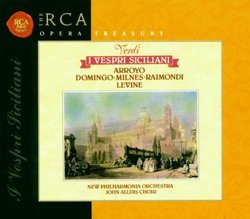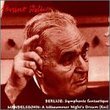| All Artists: Sherrill Milnes, James Morris, Richard van Allan, Ruggero Raimondi, Terence Sharpe, Giuseppe Verdi, James Levine, New Philharmonia Orchestra, Maria Ewing, Martina Arroyo, Alan Byers, Kenneth Collins, Leo Goeke, cd tracks for disc #1 are incorrectly repeated for disc #3 Title: Verdi: I Vespri Siciliani Members Wishing: 1 Total Copies: 0 Label: RCA Release Date: 8/10/1999 Album Type: Original recording remastered Genre: Classical Style: Opera & Classical Vocal Number of Discs: 3 SwapaCD Credits: 3 UPC: 090266349227 |
Search - Sherrill Milnes, James Morris, Richard van Allan :: Verdi: I Vespri Siciliani
 | Sherrill Milnes, James Morris, Richard van Allan Verdi: I Vespri Siciliani Genre: Classical
|
Larger Image |
CD DetailsSimilar CDs
|
CD ReviewsA Great Cast In An Opera With Some Great Moments Timothy Kearney | Hull, MA United States | 06/23/2004 (4 out of 5 stars) "Like so many operas, my first introduction to I VESPRI SICLILIANI was via a Metropolitan Opera radio broadcast. I remember falling in love with some parts of the opera, but did not purchase a recording of the work until many years later when a live version was released on CD. The live version had some flaws, so when RCA re-released this version, I purchased it right away. Objectively, it is easy to see why it never became a mainstay in most opera houses. It is a somewhat long opera and it is one of Verdi's less consistent works. While it contains some great moments, beginning with the overture which is a popular concert piece, and some great vocal opportunities for the lead soprano, tenor, bass, and baritone, there are some lackluster moments, choral parts that are difficult even for the best choral groups, and a long ballet that has some interesting musical moments but is just a bit too long. Keep in mind, however, that Verdi at his not so great is still better than most composers and fans of Verdi will find much to love in this opera and recording.The cast of this recording is what makes it a treasure. Many lament the fact that the original Elena, Montserrat Caballe had to be replaced. While I have no doubt she would compliment an already great cast, she was replaced by Martina Arroyo who is more than adept at the role. Martina Arroyo, in my opinion, is a vastly underrated soprano and her vocal talents shine forth in this set in the role of Elena. She sings the powerful and difficult Act I aria "Coraggio su Coraggio" with ease. She likewise sings the opera's showpiece "Mere Dilette Amiche" rather well and compares with the likes of Callas and Sills who used this work as a concert piece. We also have a young Placido Domingo as Arrigo. His Act IV aria "Giorno di Pianto" alone makes the set invaluable. Other principals in top vocal form include Sherill Milnes as Monforte, Ruggerio Raimondi as Procida, and Maria Ewing as Ninetta. We also have a young James Levine conducting the New Philharmonia Orchestra. His handling of the score shows the promise of the great conductor he would one day be.I own two recordings of this opera: this studio version and a live version from La Scala. Both sets have merits, but I prefer this version largely due to the performers. It has been re-released by RCA as a mid-priced collection and should be at home with Verdi fans." Verdi Makes a Faux-Satin Purse of a Sow's Ear William T. Clegg | Pocatello, Idaho United States | 09/21/2000 (4 out of 5 stars) "This was Verdi's first try at writing an original work for the Paris Opera. The librettist, Scribe, gave Verdi a warmed-over millstone of a libretto that he'd originally written for Donizetti. The five-act structure in combination with the cliche of a text proved too cumbersome, for in spite of all the glorious music Verdi wrote to lift his work out of the depths of mediocrity, the opera never makes the "escape velocity" of "Aida", "Traviata", etc. It does, however, make several sustained flights, enjoyable even if they don't last forever.RCA's 1973 recording also remains earthbound, due mainly to the tepid contribution of Martina Arroyo as Elena. Arroyo served as replacement for Montserrat Caballe, who, due to pregnancy, couldn't participate as planned. That's not to say her singing is objectionable. It's just that Caballe would have been more helpful in making the "sound and fury" cohere. Domingo, Milnes, Raimondi, and Levine are all powerful elements which make their presence strongly felt, but aren't sufficient to make their chain stronger than "the weak link".Aside from the cast, the recording was originally a model of early 70's stereo sonority. It's a shame that BMG couldn't have done a better job of transferring it to CD. In its present incarnation, the sound is painfully edgy, obscuring the warmth of the voices and instruments. In spite of the botched remastering job, this is still the best recording of this opera available on the market." Very fine job Timothy Kearney | 11/27/2003 (5 out of 5 stars) "As far as I know, there is no other recording of this opera out there to compare it to. However, I don't give it five stars because it has nothing to challenge it. I give it five stars because it is truly a wonderful recording of the work. Even if Caballe was first scheduled to sing the role of Elena, she didn't record it here, nor did she sing the role when it was premiered at the MET. Arroyo sang it then, too. It has been commented that this opera is one of Verdi's least satisfactory. I am not sure of that, Alzira is not that great. However, it is an opera with a load of problems. It is a good story, that is true (but the story is the exact same one, with names changed, as Donizetti's Duc d'Alba, a thing Verdi would later be taken to task for) but no one is very memorable as a character, or as anything. I feel for singers who have to make characters out of virtually nothing. They have great music to sing, even music that is vigorous, but they never develop as characters. Domingo at least sings a character who does develop somewhat (after all, he does learn the man he hates is really his father). The rest are so stock it isn't funny. Milnes sings wonderfully, as he does in all Verdi (and in most everything he sings) and infuses life into his character. The complaint most have is the weakness of Martina Arroyo in the role of Elena. Firstly, I doubt Verdi ever wrote such a faceless heroine in anything he wrote. Even reading the words and taking them alone nothing of importance comes out of her mouth. Caballe may have added some vocal splendors that Arroyo didn't, even used her incredible pianissimo to such affect as to make us think something was really happening here. Yet, even she couldn't give life to such a lifeless character. No wonder Verdi had such a terrible time writing this opera. Arroyo sings super well and her non-involved sound is really the result of the recording technique and not her actually singing. Her voice, in performance, gives off all sorts of nuances, shimmers with emotion, and floats effortlessly. She really does offer full developed characters. Yet, when one buys a recording, even of an opera she has made entirely her own in the theatre, all that incredible energy we are used to hearing never comes through. It is disappointing. However, she is not disappointing in her way of singing. There are many wonderful melodies to listen to in this opera, even if nothing in particular ever pops out at you. By the way, this was one opera written for Paris Verdi did NOT rework. There is no Italian version of this opera as opposed to the original French version. So you then wonder why it is in Italian, and why it seems every score you buy is in Italian. That is simple. It was translated into Italian when performed in Italy. Verdi didn't rework the score at all for this, but printers did alter vocal lines where necessary to accommodate the language change. So what we are hearing here is not the Italian version of Vespres We are hearing an Italian translation of his French opera. The work seems now to be always performed in the Italian translation. If there is a French recording of the original French words, I am not familiar with it. There may be one. Since, however, this is the only recording most of us can find of this work, this is the one we have to enjoy. It really is enjoyable, and it is well sung (Domingo actually sings a hig D in the fourth act duet). This may not be Verdi at his most inspired, but it is still super good Verdi, and many composers of the time would have considered this to be the pinnacle of perfection and ability even with all its flaws."
|

 Track Listings (26) - Disc #1
Track Listings (26) - Disc #1


